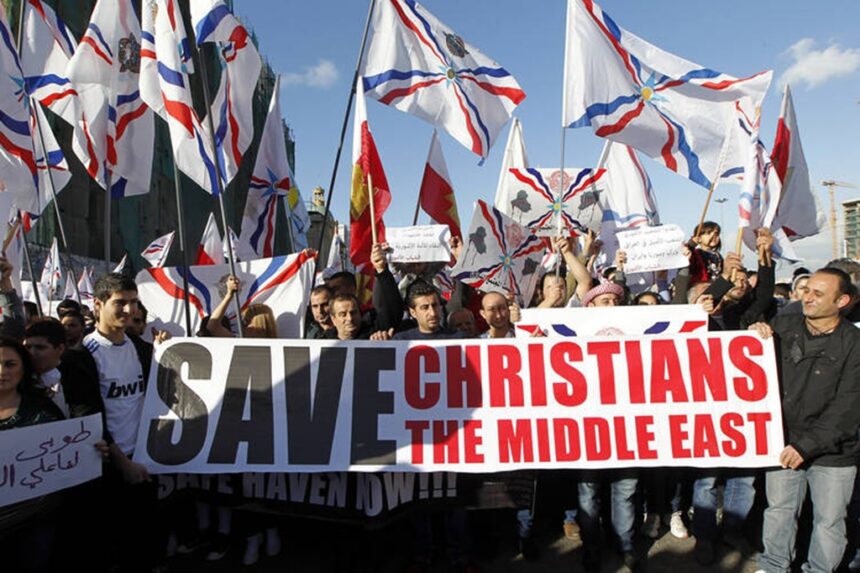NETHERLANDS – A recent report from Open Doors, an international human rights group that tracks Christian persecution, shows that Christianity faces more persecution than any other faith. Outside of North Korea, where oppression is tied to the Communist regime, most of the top ten countries with the harshest treatment of Christians are Muslim-majority nations.
Each year, Open Doors publishes its “World Watch” list, naming the 50 countries where it’s hardest to be a Christian. Their 2025 report reveals that more than 380 million Christians worldwide deal with high levels of persecution and discrimination for their beliefs.
North Korea is the only exception among the top ten; the rest—Somalia, Yemen, Libya, Sudan, Eritrea, Nigeria, Pakistan, Iran, and Afghanistan—are all countries where Islamic laws and social pressure fuel the risks faced by Christians.
Turkey is the only NATO member on the list, ranked at number 45. There, Christians face challenges from government policy, religious nationalism, and ethnic hostility.
Somalia
Somalia stands as one of the most dangerous places for Christians. After the collapse of the central government in 1991, Islamist groups and warlords filled the power vacuum. Al-Shabaab, a terror group, controls large parts of the country. The 2012 Constitution names Islam the state religion and places Sharia law above all else, making it illegal to spread other religions.
For Somali Christians, practising their faith can be life-threatening. Militant groups target Christian leaders, and women who convert to Christianity face public humiliation, house arrest, sexual violence, or forced marriage to radicals. If married, converts risk divorce and losing custody of their children, who are then raised as Muslims.
Yemen
In Yemen, multiple armed groups and factions control different regions. The civil war since 2015 has left the country deeply unstable. The official constitution backs Sharia law and offers no religious freedom. Relief aid is often given out through local Muslim organizations, which usually exclude Christians and other minorities.
In areas under Houthi control, simple acts like owning a Bible can put someone in danger. House churches are forced to disband, and at least one Christian has been killed because of his faith. Any outward sign of Christianity can lead to arrest, violence, or execution.
Libya
Libya, split between two rival governments since 2011, is the site of ongoing power struggles. On both sides, militant groups target Christians. Converts from Islam face harsh pressure from family and the community to give up their new faith. Foreign Christians, especially those from sub-Saharan Africa, often become targets of violence and crime.
The country’s laws declare Islam the state religion and Sharia law as the main source of legislation, making life for Christians especially tough.
Sudan
Sudan’s civil war, which broke out in April 2024, has forced millions from their homes and created severe hunger. Christian communities face the threat of violence and have had churches and homes seized. Discrimination keeps many Christians from getting help during the crisis, leaving them even more vulnerable.
Eritrea
In Eritrea, the government controls every part of daily life, and only one political party is allowed. Christians, especially those not part of state-approved churches, are seen as a threat and face arrest, harassment, and violence. Many spend years in detention without charges. The state keeps close watch over phone calls and online activity, making daily life tense and unpredictable for believers.
Nigeria
Nigeria, with a large Christian population, has seen repeated attacks on churches and communities. Groups like Boko Haram, ISWAP, and Fulani militants carry out raids marked by abductions, sexual violence, and killings. Many girls and women are kidnapped, abused, or forced into marriage with militants.
Pakistan
In Pakistan, blasphemy laws are often used against minorities, with Christians hit the hardest. These laws carry the death penalty, and even the accusation alone can lead to mob violence. Christian girls are at risk of being abducted, abused, and forced to convert, sometimes with lower courts supporting these actions. Many Christians are trapped in bonded labour.
Iran
In Iran, Christians who converted from Islam often face harsh treatment from the government and sometimes their own families. The authorities see these converts as tools of foreign powers. While some Christian groups are legally recognized, they are treated as second-class citizens and denied basic rights.
Afghanistan
Afghanistan, now under Taliban control since 2021, remains one of the hardest places to be a Christian. Converts risk violence or even death if discovered by family or the authorities. Many have had to flee the country. Women and minorities who become Christian face even more severe discrimination and threats.
Across the Middle East, Asia, and Africa, the pattern is clear. Christians and other non-Muslims in Muslim-majority countries often endure violence, discrimination, and social exclusion.
Global Christian Persecution
Christian Persecution comes from both governments and local communities. For many, just practising their faith or even owning a religious book puts them at risk. In these countries, religious freedom is rare, and daily life for non-Muslims can mean facing threats, hardship, and a constant fear for safety.
European countries are urged to consider these realities when shaping their policies on Sharia law and immigration, keeping the basic right to religious freedom in mind.
Christian persecution remains a significant global issue, with millions of Christians facing high levels of persecution or discrimination worldwide, an increase of 15 million from the previous year.
The most severe persecution occurs in regions like Sub-Saharan Africa, the Middle East, and parts of Asia, driven by a combination of authoritarian regimes, religious nationalism, and extremist violence.
Approximately 1 in 7 Christians worldwide (around 300-380 million) experience significant persecution, including violence, imprisonment, displacement, or discrimination due to their faith.
Over 16.2 million Christians are among the 34.5 million displaced people in Sub-Saharan Africa, often due to targeted attacks by Islamic militants or unstable governments.
Nearly 15,000 churches or Christian properties were attacked or closed in 2023, a sevenfold increase from the previous year, with notable closures in China (10,000 churches) and Algeria (all Protestant churches).
How to Help
- Prayer and Advocacy: Use reports like the World Watch List to guide prayers and advocate for religious freedom.
-
Support Organizations: Donate to groups like Open Doors, ACN, or Global Christian Relief for aid and advocacy.
-
Policy Engagement: Support designations like Nigeria as a Country of Particular Concern to promote global religious freedom.
For further details, explore the full reports at Open Doors (www.opendoors.org), ACN (www.churchinneed.org), or ICC (www.persecution.org).







